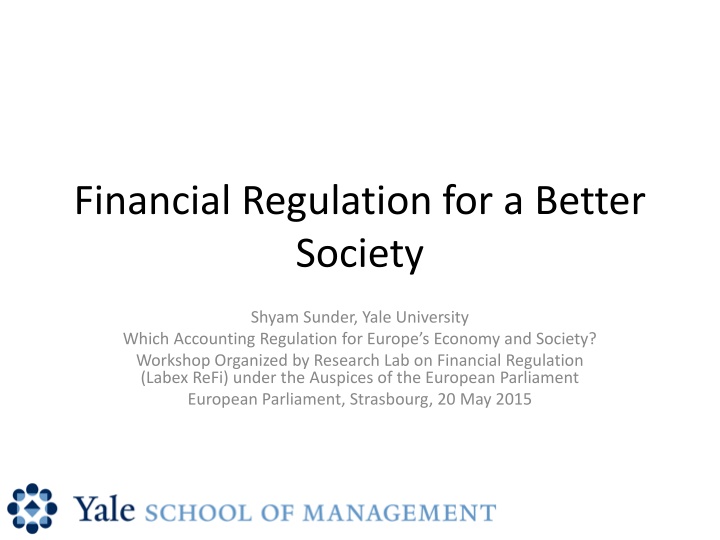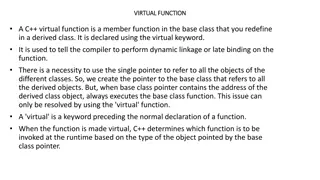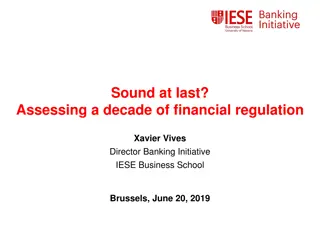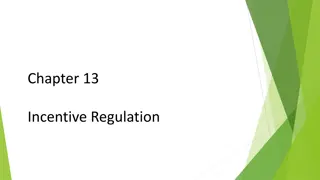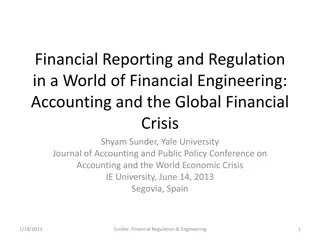Financial Regulation Challenges in a Virtual World
Virtual nature of financial objects poses unique challenges for regulation. From insurance to investment banking, understanding and adapting to these challenges is crucial for effective oversight and control in the financial sector.
Download Presentation

Please find below an Image/Link to download the presentation.
The content on the website is provided AS IS for your information and personal use only. It may not be sold, licensed, or shared on other websites without obtaining consent from the author.If you encounter any issues during the download, it is possible that the publisher has removed the file from their server.
You are allowed to download the files provided on this website for personal or commercial use, subject to the condition that they are used lawfully. All files are the property of their respective owners.
The content on the website is provided AS IS for your information and personal use only. It may not be sold, licensed, or shared on other websites without obtaining consent from the author.
E N D
Presentation Transcript
Financial Regulation for a Better Society Shyam Sunder, Yale University Which Accounting Regulation for Europe s Economy and Society? Workshop Organized by Research Lab on Financial Regulation (Labex ReFi) under the Auspices of the European Parliament European Parliament, Strasbourg, 20 May 2015
An Overview Why financial regulation Special challenges of financial regulation How can we meet these challenges? False starts Prospects Concluding remarks Sunder: Financial Regulation for Better Society
Why Financial Regulation: Goals and Scope Finance involves exchange of resources separated in time, some times by years Time lags create commitments, uncertainty, moral hazard, and defaults/disappointments How to reap benefits of finance investment, consumption smoothing without incurring excessive frictional costs Insurance, banking, real estate and consumer finance, brokerage, trading, investment banking and management, financial reporting, auditing: all call for some form of regulation to control these frictions Sunder: Financial Regulation for Better Society
Functions of Regulation Insurance: so premiums are available to pay policy claims Banking: so depositor money is safe; excess leverage Real estate: construction, ownership, maintenance Consumer finance: unfair practices (information, usury) Brokerage: safety of investor money; misinformation Trading: fair price, insider trading Investment banking: misinformation about investment prospects Investment management: safety, returns, cost, info. Financial reporting: disclosure and measurement of financial status and performance of organizations (business, non-profit, govt.) Audit banks, brokers, corporations: verifying financial reports, fraud, and compliance Sunder: Financial Regulation for Better Society
Special Challenges of Regulating Finance Regulating objects with physical substance (e.g., medicine, baby clothes, food, cars) is easier Defined by difficult-to-change physical properties Objects of finance are virtual: incomplete contracts, understandings and expectations, without physical substance Their attributes are easily changed Addition of new attributes, conditions to contracts Financial engineering: smart adversary to regulation Cannot be regulated through written regulations Can discretionary regulation be fair regulation? Can written regulation be effective in presence of financial engineering? Sunder: Financial Regulation for Better Society
Written Regulations There are reasonable arguments for written regulations But also, reasonable limitations and criticisms of excessive dependence on written regulations Examine some consequences of such excessive dependence Sunder: Financial Regulation for Better Society
Credit Rating Agency Reforms Efforts to reform credit agencies: investor should pay for the ratings, not the issuer Rocked by public and political distaste for the role they played in the global crisis, the big three credit rating agencies were expected to make profound changes but efforts to reform have come unstuck. Stephen Foley in Outlook Unchanged, The Financial Times, p. 5, January 15, 2013 Sunder: Financial Regulation for Better Society
Taxation of Multinational Firms Tax rates of multinational have dropped in the recent decades far more than the drop in national tax rates. Governments want to close loopholes that help multinationals avoid tax but will have to balance any crackdown against their need to attract big foreign investors. Venessa Houlder, Unsafe Offshore, The Financial Times, p. 5, January 14, 2013. Sunder: Financial Regulation for Better Society
Yen Libor Manipulation If you keep the six-month Japanese yen Libor unchanged for the day, I ll pay you $50,000, $100,000 whatever you want I m a man of my word. Hayes of UBS AG. I dun mind helping on your fixings, but I am not setting libor 7 points away from the truth (69 points). I ll get UBS banned if I do that. Darin He submitted 67. William D. Cohan, UBS Libor Manipulation Deserves the Death Penalty, in Bloomberg News, December 23, 2012. Sunder: Financial Regulation for Better Society
No Free Lunch in Bank Capital Regulation Basel II raised the bank capital requirement Bank responded by getting their loans off their books through securitization so they will have to hold less capital (and earn a higher return on it) Capital regulation based on risk-weighted assets encourages innovation designed to circumvent regulatory requirements and shifts banks' focus away from their core economic functions. "Systemically Important Banks and Capital Regulation Challenges". OECD Publishing. December 2011. Banks misclassified the risk of their assets to avoid holding more capital Sunder: Financial Regulation for Better Society
Basel II Bank Capital Regulation 2007: Capital was 11 percent of risk-weighted assets for 10 largest US banks But if you excluded goodwill, intangibles and deferred tax assets (which tend to become worthless under financial stress), their capital was only 2.8 percent Sunder: Financial Regulation for Better Society
How Does Basel III Address this Problem? More arcane and complex rules for calculating bank capital (opening more loopholes for financial engineering your way around the capital standards Set the capital/asset requirement to 3 percent (about the same as the actual 2007 level) Sunder: Financial Regulation for Better Society
Basel I, II, III, and Counting Each new Basel (bank capital) standard attempts to correct the errors and unintended consequences of earlier versions. But instead of resulting in better outcomes, each do-over has been more complicated and less effective than the last. Most disturbingly, each fails to provide enough real capital to absorb unexpected shocks to the economy. Thomas M. Hoenig (Vice-Chairman FDIC), Get Basel III Right and Avoid Basel IV, The Financial Times, December 12, 2012. Sunder: Financial Regulation for Better Society
Consequences of Deposit Insurance Shifted the burden of ensuring bank capital adequacy to regulators from depositors Regulators must have written rules to avoid appearing arbitrary or biased Written rules also serve as roadmaps for evasion Post-FDIC, depositor disinterest in monitoring cut bank capital from an average of 10 to about 3 percent (about 2 percent for some large EU banks) Is it better to shift some (e.g., 50%) or all of the responsibility for monitoring banks back to depositors Sunder: Financial Regulation for Better Society
Financial Engineering and Financial Regulation These are just a few examples of the conflict between financial regulation and financial engineering. How long can the regulatory walls hold? Basel I proposed in 1988, and lasted for 16 years Basel II proposed in 2004 and lasted less than half-a-dozen years (until the financial crisis 2007- 10) Basel III proposed in 2010, and has been hollowed under industry pressure before its implementation began Sunder: Financial Regulation for Better Society
Regulation of Financial Reporting What is makes a good financial report? True and Fair was the old standard But it is a matter of judgment, applied to big picture of the financial report Cannot be written down as a rule Principles over rules of accounting: good idea But no profession has 3,000 pages of principles already, and more are coming Religion: how many Commandments? Sunder: Financial Regulation for Better Society
Financial Engineering and Reporting Cat-and-mouse game between accounting rule makers and financial engineers 65 pronouncements on rules for lease accounting over the past 60 years, and more coming soon Have not yet managed to get any significant number of long term leases capitalized on balance sheets Accounting rule writers (e.g., FASB, IASB) are guaranteed losers in this game What can they do? What should they do? We have to think structuring and design a process which is robust to financial engineering Sunder: Financial Regulation for Better Society
Alternative to Written Standards Are accountants content to have financial engineers frustrate every their attempts to improve reporting? Are they willing to devise a better strategy? What could be a better strategy? Why do accountants keep losing the game Should they try to restructure the game to have a chance to win? Sunder: Financial Regulation for Better Society
Why Do Accountants Lose to Financial Engineers? Regulatory monopolies in almost all accounting domains in all parts of the world (including the US and the EU) Most accountants find it difficult to imagine working in an environment without a single set of rules they are required to follow The single set of rules make them sitting ducks for financial engineers Alternative: try regulatory competition Sunder: Financial Regulation for Better Society
What is Regulatory Competition? Two or more sets of regulations compete for clients within a single domain E.g., university education, stock exchanges, incorporation of businesses in the US, Internet protocols, etc. Clients choose between the alternative regulatory regimes (pay a fee) Competing regimes try to attract more client (firms, their managers and investors in case of financial reporting) Allows learning, comparison, evolution of social systems Sunder: Financial Regulation for Better Society
Two Questions How will regulatory competition help resist financial engineering? Will regulatory competition succumb to race to the bottom? Sunder: Financial Regulation for Better Society
No Race to the Bottom Universities and stock exchanges do not race to the bottom Because students and their employers can see the quality of education associated with their degrees In regulatory competition in financial reporting, greedy managers might be tempted to choose poor accounting standards But they are watched by their investors who will monitor and abandon firms providing poor reports Competition for investment will help constrain race to the bottom Sunder: Financial Regulation for Better Society
Resisting Financial Engineering Under competing standards, rule-makers will have reasons to develop reporting regimes which are more resistant to financial engineering Analysts and investors will have to be more sophisticated to compare reports from firms which conform to various reporting regimes They will have better capabilities to analyze and see through the engineered financial reports under competition than under the comfort of the current monopoly Sunder: Financial Regulation for Better Society
In Summary Financial regulation is essential for economic welfare Regulation of financial reporting has remained confined to creating monopoly regimes susceptible to financial engineering (financial crisis) To improve our economic performance, we need to think seriously about alternative approaches, such as regulatory competition in financial reporting Sunder: Financial Regulation for Better Society
Thank You. Shyam.sunder@yale.edu www.som.yale.edu/faculty/sunder
